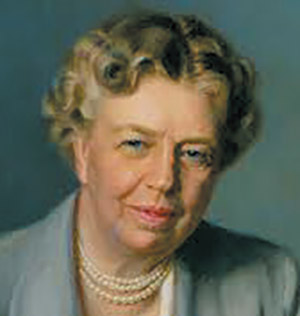

In a time where the role of women in society was restricting, Eleanor Roosevelt chose not to conform to conventional standards and went on to become one of the greatest political and moral leaders of her time.
Eleanor Roosevelt, daughter of the beautiful debutante Rebecca Hall and troubled addict Elliot Roosevelt, was born into a misfortune-stricken family of high society. Eleanor’s childhood nickname, “Granny,” bestowed upon her by her mother as a cruel allusion to her subpar looks, epitomizes the isolation Eleanor faced growing up. This isolation is often attributed to Eleanor’s painfully shy idiosyncrasies which she battled the rest of her life. Her father was seldom present during Eleanor’s upbringing. Nonetheless, he constantly made lofty unfulfilled promises, leading to her disillusionment with her father in her young impressionable mind. Growing up, Eleanor felt the burden of solitude, a burden which was augmented by being orphaned before the tender age of 10. The combination of her family difficulties and reserved persona was the direct cause of her childhood unhappiness and struggle to survive high society life.
Eleanor married Franklin Delano Roosevelt, the god-son of her late father and her fifth cousin, on March 17th, 1905. This new union placed her under the reign of her new controlling mother-in-law, Sara Delano Roosevelt. Eleanor’s lack of confidence caused her to live her life for others, be it her repressive family members or demented mother-in-law.
As she got older she began to develop skills that enabled her to become an individual, skills she developed only after pursuing new learning opportunities and viewing life from different perspectives. She found meaning in her life by aiding those in need; she realized it is not enough to give time and resources for the sake of bettering the world, but it is equally as important to listen to people, understand them. In her autobiography, Eleanor believed that “the most important thing in any relationship is not what you get but what you give.” She grew to understand that helping people better themselves is only a mechanism to bettering oneself. Only after she allowed herself to face new experiences did Eleanor gain the necessary strength to impact the world around her.
When her husband was elected into official positions, Eleanor found herself thrust into public life, challenged with new responsibilities. As the First Lady, Eleanor utilized her political power to improve problems facing the American public. By following her moral beliefs, Eleanor was able to have an innumerable effect on the country. Arguably, the precedent she set for future female leaders was more remarkable, breaking the image of the traditionally objectified role of females accepted at that time. Eleanor thrived as First Lady, chasing opportunities to acquire knowledge and experience, finally overcoming the difficulties of her childhood by firmly establishing herself as an individual.
Perhaps the most valuable contribution in Eleanor’s life was not her achievements, but rather her teachings. Closely examining her life story, the actions she took reveal many lessons of perseverance, compassion, and innovation. She believed in the importance of knowledge and experience, concluding that the best way these can be attained is to engage in one’s own interests. Her life served as a testimonial to the notion that individuality may begin once adversity is conquered; each individual will face challenges and the product of life is dependent on the response to tribulation. Eleanor Roosevelt believed in the goodness of mankind, the greatness of the individual, and that “life was meant to be lived, and curiosity must be kept alive. One must never, for whatever reason, turn his back on life.”
As the celebrate the holiday of Purim, appropriately coinciding with women’s history month, the parallels between Eleanor Roosevelt and the Megilah’s heroine, Esther, cannot be ignored. Esther also had a difficult childhood, orphaned and forced to be raised by extended family.
Mirroring Eleanor Roosevelt, Esther was thrust into high society life against her wishes, and propelled into a position of political power. Although initially reluctant, Esther utilized her newly found power, prioritizing the salvation of the Jewish people above her own safety. By taking risks, Esther prevailed over adversity and as a result saved the Jewish nation.
Esther’s actions assert that the adversity one overcomes in life is the legacy one leaves behind and, in her case, that legacy is the Jewish people. In a time where women were exponentially more restricted by society than in the time of Eleanor Roosevelt, Esther cowered when tasked with saving the nation. Esther’s life was full of challenges, and the very thought of approaching the king unannounced was almost a certain death sentence. Esther has left a legacy because despite the fact that she cowered, she did not become consumed by her fear; she went on with tenacity and strength. Esther personified Eleanor Roosevelt’s words 2,476 years before they were spoken, and by not turning her back on life, Esther ensured the continuation of Jewish life.













